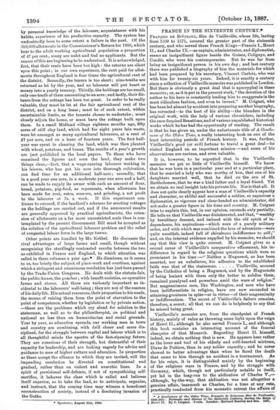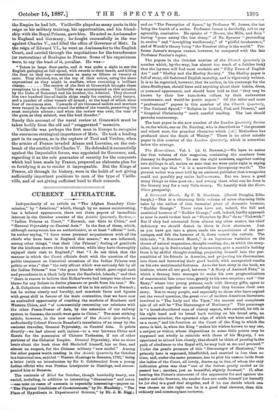FRANCE IN THE SIXTEENTH CENTURY"
FaeNcets DE &BREAUX, Sire de Vieilleville, whose life, lasting from 1509 to 1571, covered the greater part of the sixteenth century, and who served three French Kings—Francis L, Henri II., and Charles IL—as captain, administrator, and diplomatist, seems an insignifieant figure beside the Guises, Colignys, and Cond6s who were his contemporaries. But he was far from being an insignificant person in his own day ; and but century there was published a biography of him the materials for which had been prepared by his secretary, Vincent Cathie, who was with him for twenty-six years. Indeed, it is exactly a century since a collection of Vieilleville memoirs was published in London. But there is obviously a great deal that is apocryphal in these memoirs ; or, as it input in the present work, "the devotion of the author to his hero is constantly leading him to exaggerate in the most ridiculous fashion, and even to invent." M. Coignet, who has been led almost by accident into preparing another biography, has corrected—to the best of his ability—the blenders in the original work, with the help of various chroniclers, including the once despieedBrantOme, and of various unpublished historical works which he-has had the opportunity of reading. The result is that he has given us, under the unfortunate title of A Gentle- man of the Olden Time, a really interesting book on one of the least interesting periods of French history. It was, further, Vieilleville's good (or evil) fortune to travel a great deal—he visited England on an important mission — and some of his observations are curious, and even valuable.
It is, however, to be regretted that in the Vieilleville memoirs we get so little of Vieilleville himself. We know that he was born in a particular year and at a particular place, that he married a lady who was worthy of him, that one of his daughters married well, that he died on the eve of St. Bartholomew, that he was a kind father and a loyal friend. Yet we obtain no real insight into his private life. Eerie that all. It, does not quite clearly appear how a man of Vieilleville's capacity and character, so skilful and successful a soldier, so sagacious a diplomatist, so vigorous and elear-headed an administrator, did not make a greater figure in his time and country. M. Coignet tries to explain this, but, in our opinion, succeeds only partially. He Whin that Vieilleville was disinterested, and that, "wealthy by hereditary descent, and imbued with the old spirit of in- dependence, his aspirations—which were of a purely military order, and with which was combined the love of adventure—were quite unselfish, indeed full of chivalrous indifference to self;" and, on the internal evidence supplied by his memoirs, we should say that this view is quite correct. M. Coignet gives us a second cause of Vieilleville's comparative effacement, his in- difference in regard to the religions questions which were so prominent in his time :—" Neither a Huguenot, as has been asserted, nor an unbeliever, his adhesion to the established faith was that of the statesman Vieilleville, accused by the Catholics of being a Huguenot, and by the Huguenots of being lenient with them only the better to subdue them, remained paralysed and powerless amid the ware of religion?' But magnanimous men, like Washington, and men who have been indifferentists in religion, have ere now succeeded in attaining greatness in spite—or in virtue—of their magnanimity or indifferentism. The secret of Vieilleville's failure remains, therefore, a secret ; all that we can do is helplessly to say that he missed being great.
Vieilleville's memoirs are, from the standpoint of French history, mainly of value as throwing some light upon the reign of Henri II., although he also served Francis L, and although this book contains an interesting account of the funeral obsequies of that Monarch. Regarding Henri II. himself, indeed, we obtain nothing that is new. He appears here rather as the lover and tool of his elderly and cold-hearted mistress, Diane de Poitiers, than in any nobler capacity ; and he never showed to better advantage than when he faced the death that came to him through an accident in a tournament. As for his reign, it is distinguished mainly by the beginning of the religious wars in France, and by the straggle with Germany, which, though not particularly notable in itself, yet led in the long-run to the abdication of Charles V.,— although, by-the-way, that abdication was not altogether a genuine affair, inasmuch as Charles, for a time at any rate, practically conducted from his monastic retreat the affairs of • A (landsman of the Olden Time, Prammie de Sayeaus, Sire de icia5les111e, 1801MM ..Aw‘mi Stories of Ma Siateowth Century, daring tits Itsign of Hang II. By 0. Caignat. .2 vols. 1.11d10/ Blamed Bantloy and Boa. 1138I„ theEmpire he had left. Vieille,/Ule playedasmany parts in this reign as his military training, his opportunities, and his friend- ship with the Royal Princes, gave him. He acted as Ambassador to England and Germany ; he fought successfully in the war against Charles V., and filled the office of Governor of Metz. In the reign of Edward VL, he went as Ambassador to the English Court, and carried through the negotiations for the transference (or restoration) of Boulogne to France. Some of his experiences were, to say the least of it, peculiar. He was- " Taken to large deer-parks, and it wet, quite a eight to sae the English galloping at full speed, with swords in their hands, and killing the deer as they ran—sometimes as many as fifteen or twenty at once. They shouted, too, at the top of their voices, using the same expressions as they might in warfare, when executing a brilliant
charge The review of the fleet at Greenwich brought these receptions to a close. Vieilleville was accompanied on this occasion by the Duke of Somerset and his brother, the Admiral. They showed him two hundred line-of.battle ships ready for combat, sixty barges, and a number of other vessels all armed ; at the head of which were four of enormous size. Upwards of six thousand sailors and marines were ranged in due order round the sides of the vessels, preserving the most complete silence, and when the review was over, the roar of the guns, as they saluted, was like loud thunder."
Surely this account of the naval review at Greenwich must be taken bodily from the old and " exaggerated" memoirs.
Vieilleville was perhaps the first man in Europe to recognise the enormous strategical importance of Metz. He took a leading part in its capture, as in the capture of Tool and Verdun, when the armies of France invaded Alsace and Lorraine, on the out- break of the conflict with Charles V. He defended it successfully against the Imperialist forces, was appointed its Governor, and, regarding it as the sole guarantee of security for the conquests which had been made by France, prepared an elaborate plan for so fortifying it as to render it impregnable. But the Kings of France, all through its history, were in the habit of not giving sufficiently important positions to men of the type of Vieille- ville, and of not giving sufficient heed to their counsels.



































 Previous page
Previous page